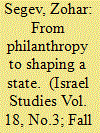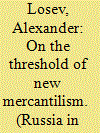| Srl | Item |
| 1 |
ID:
123879


|
|
|
|
|
| Publication |
2013.
|
| Summary/Abstract |
Rose Jacobs and the organization among whose leaders she numbered-Hadassah, the American Women's Zionist organization-made, during the 1930s and 1940s, important and unprecedented inroads into the Zionist establishment. Jacobs and other Hadassah women used their organization's size and financial power to claim a voice in the making of Zionist policy both in the United States and in the Jewish community in Palestine. The political, international, and economic crises of these two decades enabled Hadassah to expand out of the traditionally female areas to which it had originally been restricted-health and education-and make its voice heard on other issues, among them Jewish-Arab relations. This culminated in Jacobs' election to the Jewish Agency Executive in 1938. Hadassah broke the limitations under which Jewish women's organizations had theretofore operated and used its newfound influence to offer alternatives to the male Zionist leadership's cultural, social, and political doctrines.
|
|
|
|
|
|
|
|
|
|
|
|
|
|
|
|
| 2 |
ID:
151543


|
|
|
|
|
| Summary/Abstract |
The Soviet Union broke up twenty-five years ago, therefore it does not make much sense to explain in detail how much has changed since then in the public mind, in politics, and in the economy. Any anniversary is an occasion to look back in an attempt to find answers to questions such as: What trends have prevailed? What have we, Russians, lost and what have we gained? And what impact has the disappearance of the Soviet superpower had on the rest of the world?
|
|
|
|
|
|
|
|
|
|
|
|
|
|
|
|